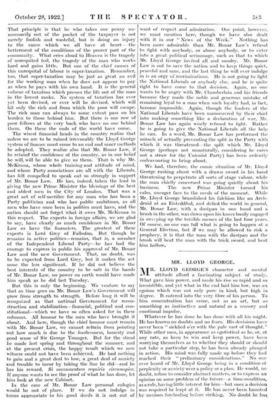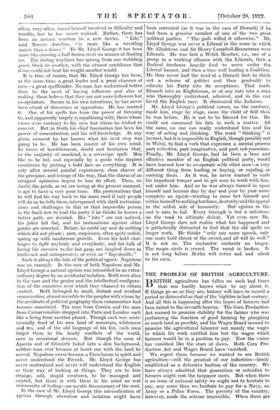MR. LLOYD GEORGE.
MR. LLOYD GEORGE'S character and mental attitude afford a fascinating subject of study. What gave him power, and made his rise so rapid and so irresistible, and yet what in the end laid him low, was an egoism which was not only pure in kind, but high in degree. It entered into the very fibre of his person. To him concentration has come, not as an art, but as something as instinctive and natural as a sensory and emotional impulse.
Whatever he has done he has done with all his might. He has known no doubts and no fears. His decisions have never been " sicklied o'er with the pale cast of thought." While other men, in appearance as egotistical as he, or, at any rate, as keen to win and keep power, have been worrying themselves as to whether they should or should not take a particular step, he has been already plunged in action. His mind was fully made up before they had reached their " preliminary considerations." No one ever heard of Mr. Lloyd George being in a condition of perplexity or anxiety over a policy or a plan. He would, no doubt, refuse to consider abstract matters, or to express an opinion on some problem of the future--a time-condition, as a rule, having little interest for him—but once a decision was required he leapt at it. He has never been haunted by anxious foreboding before striking. No doubt he has, often, very often, found himself involved in difficulty and trouble, but he has never repined. Rather, there has been an instant reaction to a new device. " Life," said Marcus Aurelius, " is more like a wrestling match than a dance." To Mr. Lloyd George it has been more like crossing a half-frozen river on masses of floating ice. The daring wayfarer has sprung from one wobbling green block to another, with the utmost confidence that if one could not'bear his weight another would.
It is true, of course, that Mr. Lloyd George has been, at the same time, a great leader and a great charmer of men—a great spellbinder. No man has understood better than he the need of having followers and also of making them believe that they are not mere followers but co-operators. Secure in his own intentions, he has never been afraid of discussion or opposition. He has courted it. One of his spells has -been the power of listening to, and apparently largely sympathizing with, those whose views were contrary to his own but whom he wished to convert. But in truth his chief fascination has been his power of concentration and his self-knowledge. At any given moment he has known what his next step was going to be. He has been master of his own mind. In times of bewilderment, doubt and hesitation that, to the majority of mankind, is a sovereign spell. Men like to be led, and especially by a guide who inspires confidence by putting a bold face on everything. It is only after several painful experiences, close shaves of the precipice, and losings of the way, that the charm of an arrogant optimism begins to lose its effect. Then, no doubt, the guide, as we are seeing at the present moment, is apt to have •a very poor time. His protestations that he will find his way back to the main road if only people will do as he tells them,interspersed with shrill recrimina- tions and challenges to this or that impossible person in the back row to lead the party if he thinks he knows a better path, are derided. His " hits " are not noticed, his jokes fall flat, and his insinuations against other guides are resented. Before, he could say and do nothing which did not please ; now, suspicions, often quite unfair, spring up with mushroom growth. Even his bold chal- lenges to fight anybody and everybody, and. his talk of facing his enemies to the last gasp, are laughed down as irrelevant and unimpressive, or even as " flap-doodle."
Such is always the fate of the political egoist. Napoleon was an example. In the case of both Napoleon and Mr. Lloyd George a natural egoism was intensified to an extra- ordinary degree by an accidental isolation. Both were alien to the race and the genius and the intellectual configura- tion of the countries over which they chanced to obtain control. Both belonged to small, distant and residual communities, almost invisible to the peoples with whom by the accidents of political geography these communities had become associated. The man from Corsica and the man from Carnarvonshire dropped into Paris and London each like a being from another planet. Though each was senti- mentally fond of his own land of mountain, wilderness and sea, and of the old language of his kin, each soon forgot them in the heady conflicts of the world, save in occasional dreams. But though the aura of Ajaccio and of Criccieth faded into a dim background, neither man ever became at heart one with the land he served. Napoleon never became a Frenchman in spirit and never understood the French. Mr. Lloyd George has never understood and never will understand the English or their way of looking at things. They are to him strange, odd, stupid creatures, to be managed and cajoled, but there is with them in his mind no real community of feeling—no mystic freemasonry of the soul. In the case of Mr. Lloyd George this intensification of egoism through alienation and isolation might have been corrected (as it was in the case of Disraeli) -if he had been a genuine member of one of the two great political parties. " The gods willed it otherwise." Mr.
Lloyd George was never a Liberal in the sense in which Mr. Gladstone and Sir Henry Campbell-Bannerman were Liberals. He was first a Welsh Member, i.e., one of a group in a working alliance with the Liberals, then a Radical freelance heavily feed to serve under the Liberal banner, and then a lone wolf leading a Coalition. He thus never had the need of a Disraeli first to think out a scheme of polities and then gradually to educate his Party into its acceptance. That made Disraeli into an Englishman, or at any rate into a man who thoroughly understood, admired, and in the end loved the English race. It eliminated the Judaism.
Mr. Lloyd George's political career, on the contrary, made him, stage by stage, more the child of Self than he was before. He is not to be blamed for this. He could not command his fate in such a matter. All the same, no one can really understand him and his way of acting and thinking. The word " thinking " is inexact, but it is impossible in English, though possibly not in Welsh, to find a verb that expresses a mental process part reflective, part imaginative, and part sub-conscious. Finally, Mr. Lloyd George, had he been a true and effective member of an English political party, would have learned how to co-operate with other men—a very different thing from leading, or buying, or cajoling, or coercing them. As it was, he never learned to curb his impatient temper and to get men to work with him, not under him. And so he was always turned in upon himself and became day by day and year by year more complete an egoist—trusting to none but himself and within himself to nothing but force, dexterity and-the appeal to the selfish side of humanity. But egoism in the end is sure, to fail. Every triumph is but a milestone on the road to ultimate defeat. Yet even now Mr. Lloyd George does not realize what has happened and is pathetically distracted to find that the old spells no longer work. He thinks " only one more speech, only one more bold thrust of the sword, and all will be well." It is not so. The enchanter enchants no longer. The magic circle is erased. The wand is broken. It is not long before Merlin will retire sad and silent to his cave.











































 Previous page
Previous page